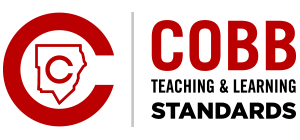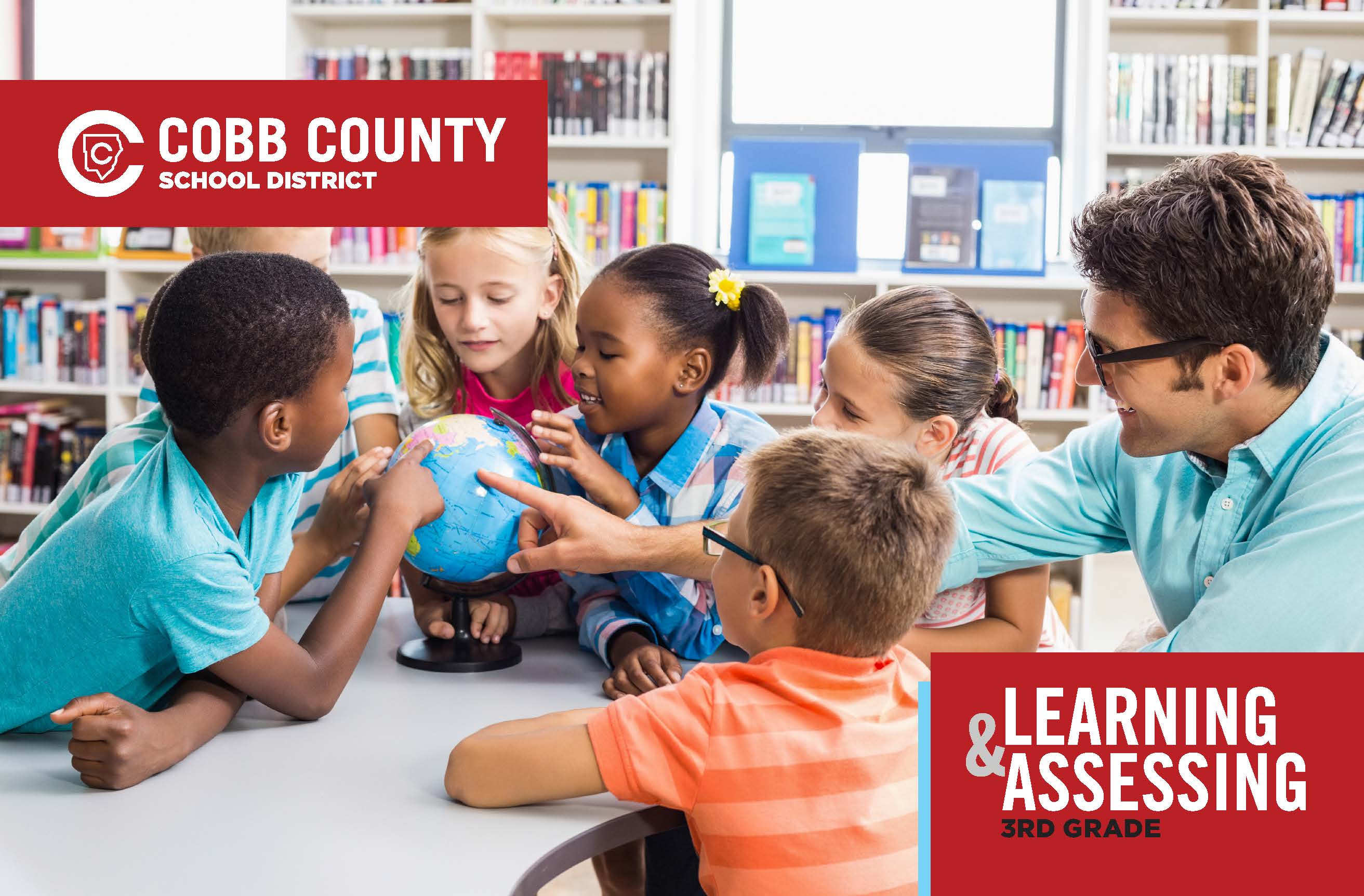3rd Grade Learning

What Do Students Learn In 3rd Grade?
3rd GRADE LEARNING :
The Cobb County School District is committed to providing your child an academic experience that will develop his or her knowledge and skills at every grade-level and to ensuring a strong foundation is established for your child to reach his or her greatest potential. Our teaching is aligned with content standards and our teachers bring those standards to life for your child through various strategies designed to meet your child’s learning strengths and needs.
In Cobb County classrooms, students are immersed every day in learning experiences based on exploration, problem-solving, and critical thinking in all content areas, including the core areas of English Language Arts, Mathematics, Social Studies, and Science; and in specialized academic content including Health, Music, Physical Education, Technology, Visual Arts, and World Languages*. Excellence in teaching guides your child’s educational experience from Kindergarten to graduation and into life.
*Programming available varies at local schools
ENGLISH LANGUAGE ARTS:
Third graders deepen their understanding of texts by reading with greater purpose and attention to meaning. As they explore a balance of literary and informational texts, students begin to analyze details, summarize main ideas, and synthesize information. They apply foundational reading skills to support comprehension of more complex texts and begin to engage more independently in research and inquiry. Writing becomes increasingly sophisticated, with students using the full writing process—planning, drafting, revising, editing, and publishing—to produce clear and purposeful compositions across a variety of genres. They begin to use technology to enhance and share their writing. Students’ vocabulary expands, and they grow more adept at choosing language that fits different contexts, audiences, and purposes. Their written and spoken responses become more logically organized, supported with evidence, and reflective of deeper thinking. Third graders demonstrate increasing control over the conventions of language, including grammar, spelling, and punctuation. They are beginning to engage in abstract discussions and explore themes and ideas that extend beyond the surface of the text. These experiences help students grow as thoughtful, independent readers and writers who can communicate with clarity and confidence.
MATHEMATICS:
In Grade 3, instructional time should regularly incorporate the 8 Mathematical Practices, the Statistical Reasoning Framework, and the Mathematical Modeling Framework through four big ideas of content: (1) numerical reasoning, (2) measurement and data (statistical) reasoning, (3) patterning and algebraic reasoning, and (4) geometric and spatial reasoning. Students are expected to develop place value understanding, part-whole strategies for addition, subtraction, multiplication, and division of whole numbers, reasoning of patterns and algebra, reasoning with measurement of time and objects, geometric angle measurement strategies, an understanding of geometric properties of shapes, and data and statistical reasoning methods.
SCIENCE:
Third grade science focuses on hands-on, student-centered exploration of the natural world. Throughout the year, students delve into Earth, Life, and Physical Sciences, building a strong foundation in core concepts while honing scientific skills like modeling and constructing explanations. They explore rocks, minerals, fossils, and soil to deepen their understanding of Georgia habitats and examine the effects of pollution on the environment. Additionally, students investigate key ideas around environmental conservation and heat, further expanding their knowledge of the world around them.
SOCIAL STUDIES:
In third grade, students begin a three-year study of United States history in which all four strands (history, geography, civics/government, and economics) are integrated. Students learn about American Indian cultures and the exploration and colonization of North America. The geography strand emphasizes the influence of geography on early U.S. history. In the civics/government strand, students learn about the elements of our representative democracy and their rights and responsibilities as good citizens. Students will extend and apply their understanding of basic economic concepts.
SPECIALS:
Awareness of historic elements inspires 3rd graders in Visual Arts. Students use observation skills to support their art production and analyze and discuss the important role of art in historic periods and cultures. In Music, students continue to develop skills in singing and playing instruments while increasing their understanding of harmonies and notation. This provides opportunities for improvisation and creating simple compositions, along with evaluation and analysis of music. In Health, students explore circulatory and respiratory systems, healthy emotional responses and family-based conflict resolutions. In PE, students learn more about the importance of physical activity as part of a healthy lifestyle.
PARENTS TIPS: Reading
Daily reading as a family is an enjoyable and important way to grow a love of learning. Create time to read during breakfast or in the evening before bed. Share your own favorite childhood books and talk about why the book is one you still love. Visit your local library and take advantage of school book fairs and literacy events. By sharing what you love about reading and showing them how much it means to you by reading with them, students will see how important literacy is in their lives.
How Do We Assess Students In 3rd Grade?
Your child will have a variety of classroom assessments that will aid his or her teacher in knowing how to provide the best possible instruction for your child. These assessments will also help you know how well your child is learning and what extra support may be needed. In addition, your child will participate in some standardized assessments that are used to gauge how well your child is doing in his or her grade level.
Third graders take two standardized assessments first semester, the Cognitive Abilities Test (CogAT) and the IOWA. The CogAT is a norm-referenced test which measures reasoning and problem-solving skills in three different areas: verbal, quantitative, and nonverbal. The IOWA assessment is a norm-referenced test that measures academic achievement.
The State of Georgia requires that students in grades 3-5 participate in the annual administration of state assessments. The state assessment is called the Georgia Milestones Assessment System. Georgia Milestones measures how well students have learned the knowledge and skills in core subjects. Students in grade 3 will take an End of Grade (EOG) assessment as part of the Georgia Milestones in math and language arts. The EOG will include multiple choice, short answer, and technology-enhanced questions. The language arts EOG has a third section, which focuses on writing.
All students in grades K-9 participate in the universal screening process for reading and math using a digital inventory. The universal screener will measure math and reading proficiency and progress three times a year.
TESTING IN 3rd GRADE:
Mark the Calendar: Cognitive Abilities Test (CogAT): September
IOWA: September
3rd grade EOG assessment: April-May
Question Types:
Multiple-choice questions (called selected-response); short answers (called constructed response); extended response – the EOG has a writing section during which students write an extended response to a question derived from paired-passages students read.
PARENT TIPS: Assessment
Parents can support students in easing any concern or anxiety about assessment:
- Talk with your child about any tests or assessments.
- Explain that assessment is a natural and important part of any learning. Tests help students understand their thinking better and make improvements for better performance in the future.
- Remind your child to pay attention to the directions and to listen carefully as they are read. Encourage your child to take time to understand the questions before selecting an answer.
- A good night’s rest is the best way to arrive focused on test day!
Remember that assessment is an important and helpful part of learning for students of all ages. Your support and involvement in your child’s education is critical to success in school and in life. Research shows when parents play a key role in their child’s learning, their child’s achievement excels.
What Instructional Resources Are Used In 3rd Grade?
CLICK HERE TO DOWNLOAD A LIST OF BOARD APPROVED INSTRUCTIONAL RESOURCES FOR THIRD GRADE
Instructional resources are provided to students and teachers to support teaching and learning. The titles listed below have been recommended to our Board by a committee of teachers, parents and community representatives and approved through the textbook adoption process (See Board Rule IFAA-R). Additional resources to enhance the instruction are constantly added by local schools and individual teachers.
Course/Content Area | Resource | Publisher |
English Language Arts | Wonders | McGraw Hill |
Mathematics | Custom Developed Mathematics Content for Grade 3 | Cobb County School District |
Science | Georgia Science, Grade 3 | HMH |
Science | Science Dimensions, Grade 3 | HMH |
Social Studies | Studies Weekly | Studies Weekly |
What Is My Student's Framework For Learning In 3rd Grade?
Third Grade Teaching & Learning Frameworks
English/Language Arts | Math | Science | Social Studies
What Does The Third Grade Report Card Look Like?
English – 3rd Grade Report Card (Rev. 3/25)
Español – Boleta de Calificaciones 3er Grado (Rev. 3/25)
Portugues – Boletim da 3a Série (Rev. 3/25)

Cobb Teaching & Learning Standards - English Language Arts
CLICK HERE TO DOWNLOAD 3rd GRADE COBB TEACHING & LEARNING STANDARDS FOR ELA
Cobb Teaching & Learning Standards - Mathematics
CLICK HERE TO DOWNLOAD 3rd GRADE COBB TEACHING & LEARNING STANDARDS FOR MATH
Cobb Teaching & Learning Standards - Social Studies
CLICK HERE TO DOWNLOAD 3rd GRADE COBB TEACHING & LEARNING STANDARDS FOR SOCIAL STUDIES
Cobb Teaching & Learning Standards - Science
CLICK HERE TO DOWNLOAD 3rd GRADE COBB TEACHING & LEARNING STANDARDS FOR SCIENCE

